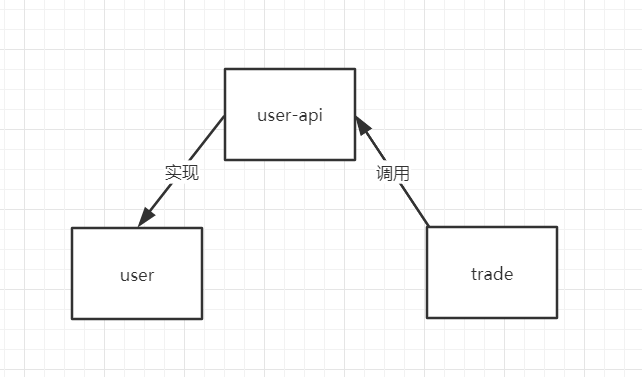移動自動化appium(2)- Allure報告使用詳解
- 2020 年 4 月 5 日
- 筆記
6 Allure報告
6.1 Allure介紹
Allure是一個獨立的報告插件,生成美觀易讀的報告,比之前的html好看,目前支持的語言:Java、PHP、Ruby、Python、C#等
6.2 Allure安裝
pip3 install allure-pytest
(注意:這裡不要使用pytest-allure-adaptor)
有一個幫助文檔可以參考:
https://docs.qameta.io/allure/#_about
生成Allure報告的命令:
pytest –alluredir report
執行完這條命令,case運行完畢後,會在當前目錄下生成一個report文件夾,裏面有一個json文件,就是生成的報告
在pytest.ini中,之前的報告是這樣生成的:
addopts = -s –html=report/report.html –reruns 1
如果想用allure,那麼改成:
addopts = -s –alluredir report –reruns 1
直接在終端執行pytest就可以了
6.3 json報告轉為html報告
上面的命令執行後,生成的是json文件,json文件不那麼好看,需要將json轉成html,這裡要先安裝一個插件,步驟:
1、下載allure壓縮包,地址:
https://dl.bintray.com/qameta/generic/io/qameta/allure/allure/2.7.0/allure-2.7.0.zip
2、解壓後,將bin目錄配置到環境變量
3、進入report的上一級目錄,執行命令:allure generate report/ -o report/html –clean
執行上面的操作步驟後,在report文件夾下就多了一個html文件夾,裏面的index.html文件就是html報告。
生成html的時候遇到這樣的報錯:
Exception in thread “main” java.lang.UnsupportedClassVersionError: io/qameta/all
ure/CommandLine : Unsupported major.minor version 52.0
那麼可能是你的jdk版本太低了,可以打開cmd,輸入java -version,以及javac -version,看一下版本,如果低於1.8,換成1.8版本就好了。
jdk1.8版本下載地址:
https://www.oracle.com/technetwork/java/javase/downloads/jdk8-downloads-2133151.html
6.4 allure+pytest實戰操作
6.4.1 step用法
@allure.step(“”):
用來描述用例步驟的,簡單一點的用法,比如新建一個項目,框架如圖:
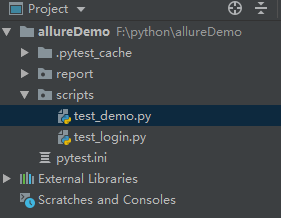
第一種用法:
在”F:pythonallureDemoscriptstest_demo.py”文件中,寫入下列代碼:
import allure class TestLogin: @allure.step("測試登錄成功的步驟") def test_login_success(self): print("login success") assert 1
在終端輸入pytest運行測試用例,然後從cmd進入到F:pythonallureDemo這個路徑,輸入allure generate report/ -o report/html –clean,生成測試報告
觀察報告結果:
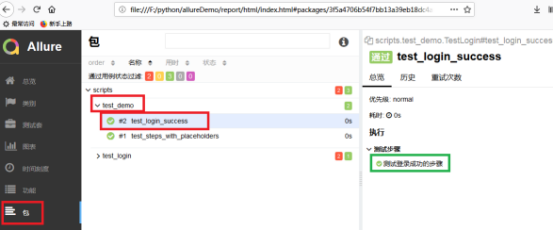
打開生成的報告,點擊左側的“包”或者“功能”,可以看到這樣的頁面,右側test_login_success是我們的測試用例,圈綠色的部分是step的內容。
第二種用法:
allure的幫助文檔中,給出的step的示例,test_steps_with_placeholders()這個測試用例:
import allure @allure.step('Step with placeholders in the title, positional: "{0}", keyword: "{key}"') def step_with_title_placeholders(arg1, key=None): pass def test_steps_with_placeholders(): step_with_title_placeholders(1, key='something') step_with_title_placeholders(2) step_with_title_placeholders(3, 'anything')
運行結果:
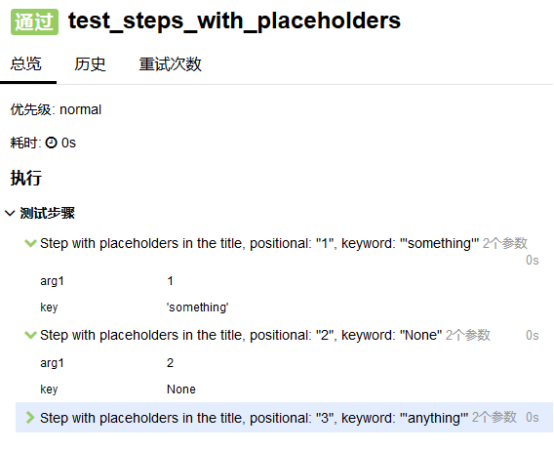
第三種用法:
第三種用法是只寫一個@allure.step,沒有參數,這種情況會直接把方法名放到步驟顯示的位置,例如:
@allure.step def test_login_fail1(self): print("login fail1") assert 0
運行結果:
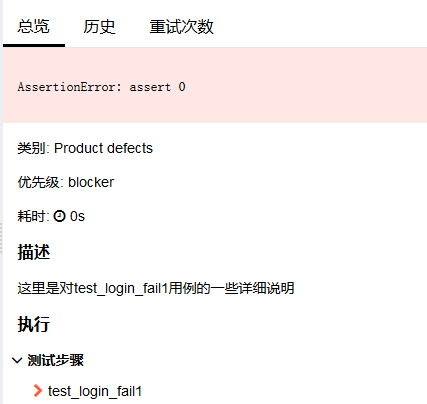
還有比如:
@allure.step
def passing_step(): pass def test_with_step_in_fixture_from_conftest(fixture_with_conftest_step): passing_step()
等等方式
6.4.2 attach()添加case描述和截圖
allure.attach()不是一個裝飾器,需要寫到test用例裏面,比如下面這樣:
def test_login_fail(self): allure.attach("輸入正確的用戶名:xxxx") print("input username") allure.attach("", "輸入錯誤的密碼:xxx") print("input password") allure.attach("", "點擊登錄") print("click login button") assert 0
第二個attach方法有兩個參數,第一個有一個,這樣寫雖然都不會報錯,但是結果會不一樣,如圖:
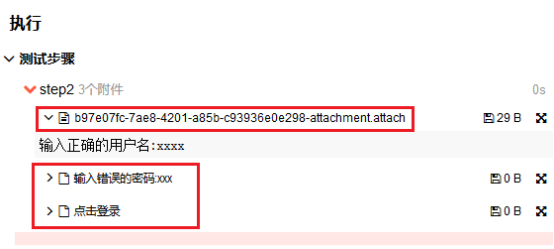
第一個,只寫了一個參數的,會像圖第一個圈紅的位置那樣,必須點開這個才會看到操作步驟,第二個和第三個,直接就可以看到操作步驟,更直觀。
attach還可以增加截圖:
def test_login_success(self): allure.attach.file(r'D:xxxxx.jpg', '我是附件截圖的名字', attachment_type=allure.attachment_type.JPG) print("login success") assert 1
結果:
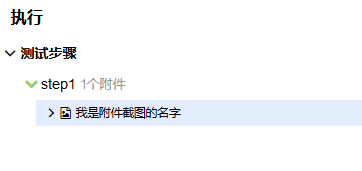
點擊截圖的名字,就可以看到截圖。
attach.file()第三個參數,還可以是allure.attachment_type.PNG、allure.attachment_type.HTML、allure.attachment_type.TEXT等。
6.4.3 Descriptions
description是顯示在描述位置的內容,可以描述一下你這個測試用例想做什麼。
第一種用法,長字符串:
@allure.description(""" Multiline test description. That comes from the allure.description decorator. Nothing special about it. """) def test_description_from_decorator(): assert 42 == int(6 * 7)
結果:

第二種用法,html格式:
可以使用html格式
import allure @allure.description_html(""" <h1>Test with some complicated html description</h1> <table style="width:100%"> <tr> <th>Firstname</th> <th>Lastname</th> <th>Age</th> </tr> <tr align="center"> <td>William</td> <td>Smith</td> <td>50</td> </tr> <tr align="center"> <td>Vasya</td> <td>Jackson</td> <td>94</td> </tr> </table> """) def test_html_description(): assert True
結果:
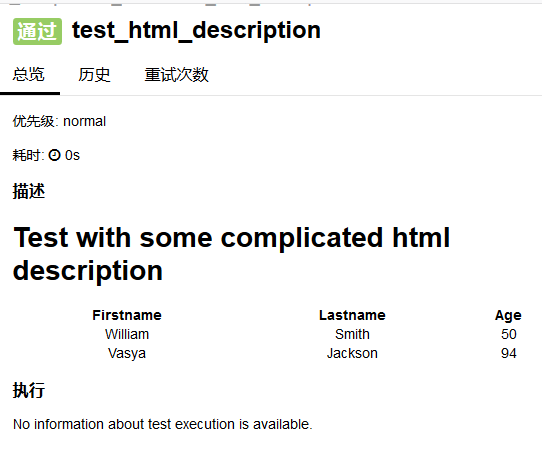
這裡如果我們只是想要用一兩句話概括這個測試用例的話,直接用一個字符串就足夠了。
第三種用法,文檔注釋:
def test_unicode_in_docstring_description(): """Unicode in description. Этот тест проверяет юникод. 你好夥計. """ assert 42 == int(6 * 7)
像這樣的文檔注釋,會直接放到報告的描述中去,如圖:
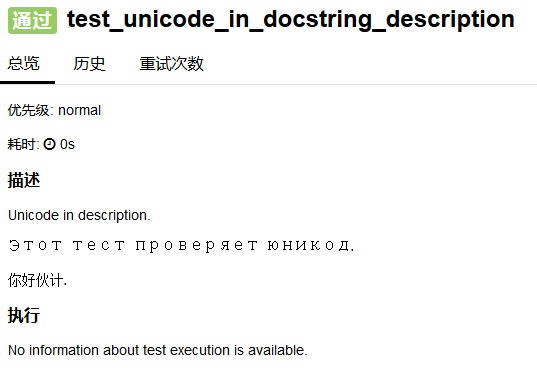
6.4.4 title用法
title就是顯示的case標題
比如這樣:
@allure.title("case1:登錄成功的用例") def test_login_success(self): allure.attach.file(r'D:一寸照報名照片.jpg', '我是附件截圖的名字', attachment_type=allure.attachment_type.JPG) print("login success") assert 1
結果如圖:
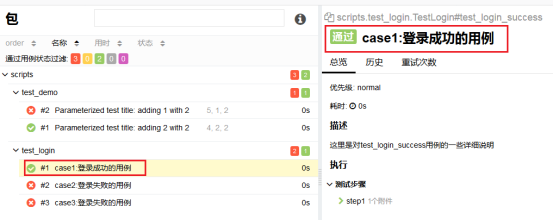
會在圈紅部分兩個地方顯示。
如果有參數的話,還可以這樣用:
import allure import pytest @allure.title("Parameterized test title: adding {param1} with {param2}") @pytest.mark.parametrize('param1,param2,expected', [ (2, 2, 4), (1, 2, 5) ]) def test_with_parameterized_title(param1, param2, expected): assert param1 + param2 == expected
結果就是這樣:
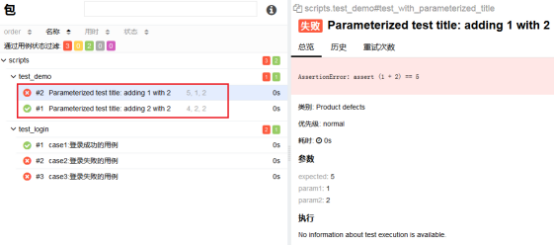
6.4.5 link超鏈接
直接把官網的例子拿過來:
import allure TEST_CASE_LINK = 'https://github.com/qameta/allure-integrations/issues/8#issuecomment-268313637' @allure.link('https://www.youtube.com/watch?v=4YYzUTYZRMU') def test_with_link(): pass @allure.link('https://www.youtube.com/watch?v=Su5p2TqZxKU', name='Click me') def test_with_named_link(): pass @allure.issue('140', 'Pytest-flaky test retries shows like test steps') def test_with_issue_link(): pass @allure.testcase(TEST_CASE_LINK, 'Test case title') def test_with_testcase_link(): pass
運行後,會出來一個鏈接,可以點擊。
6.4.6 用例級別
下面這段代碼示例里有兩個點,一個是feature方法,一個是severity
import allure @allure.feature('這裡是一級標籤') class TestLogin: @allure.title("case1:登錄成功的用例") @allure.description("這裡是對test_login_success用例的一些詳細說明") @allure.story("這裡是第一個二級標籤") def test_login_success(self): allure.attach.file(r'D:一寸照報名照片.jpg', '我是附件截圖的名字', attachment_type=allure.attachment_type.JPG) print("login success") assert 1 @allure.title("case2:登錄失敗的用例") @allure.description("這裡是對test_login_fail用例的一些詳細說明") @allure.severity(allure.severity_level.CRITICAL) @allure.story("這裡是第一個二級標籤") def test_login_fail(self): allure.attach("步驟1", "輸入正確的用戶名") print("input username") allure.attach("步驟2", "輸入錯誤的密碼") print("input password") allure.attach("步驟3", "點擊登錄") print("click login button") assert 0 @allure.title("case3:登錄失敗的用例") @allure.description("這裡是對test_login_fail1用例的一些詳細說明") @allure.severity(allure.severity_level.BLOCKER) @allure.story("這裡是第一個二級標籤") def test_login_fail1(self): print("login fail1") assert 0
點擊allure報告中的“圖表”,可以看到有優先級:

這個優先級,如果不寫,默認就是normal。用法就像標黃色底色那樣,級別總共有五個:
- BLOCKER = ‘blocker’ 中斷缺陷(客服端程序無響應,無法執行下一步驟)
- CRITICAL = ‘critical’ 臨界缺陷(功能點缺失)
- NORMAL = ‘normal’ 普通缺陷(數據計算錯誤)
- MINOR = ‘minor’ 次要缺陷(界面錯誤與ui需求不符)
- TRIVIAL = ‘trivial’ 輕微缺陷(必須項無提示,或者提示不規範)
用例分級的方法:
@allure.feature(‘這裡是一級標籤‘)
@allure.story(“這裡是第一個二級標籤“)
對應的結果為:
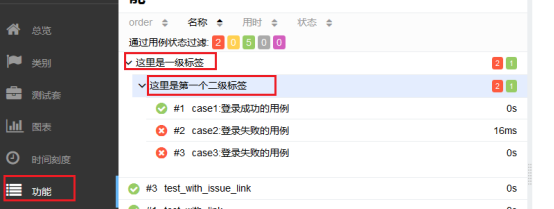
6.4.7 添加截圖
3.7.6講到過截圖的方法get_screenshot_as_file(路徑),6.4.2講了attach上傳圖片的方法,兩個方法結合起來就可以在測試過程中截圖並且傳到報告上
def test_login(self): # 輸入手機號 self.login_page.input_tel("1851062653") # 輸入密碼 self.login_page.input_pwd("sy123") time.sleep(3) # 點擊登錄 self.login_page.click_login() # 截圖的方法 self.login_page.screenshot("login_success") # 上傳到報告 allure.attach.file(r'.screenlogin_success.png', 'login_success', attachment_type=allure.attachment_type.PNG) def screenshot(self, file_name): self.driver.get_screenshot_as_file("./screen/" + file_name + ".png")

